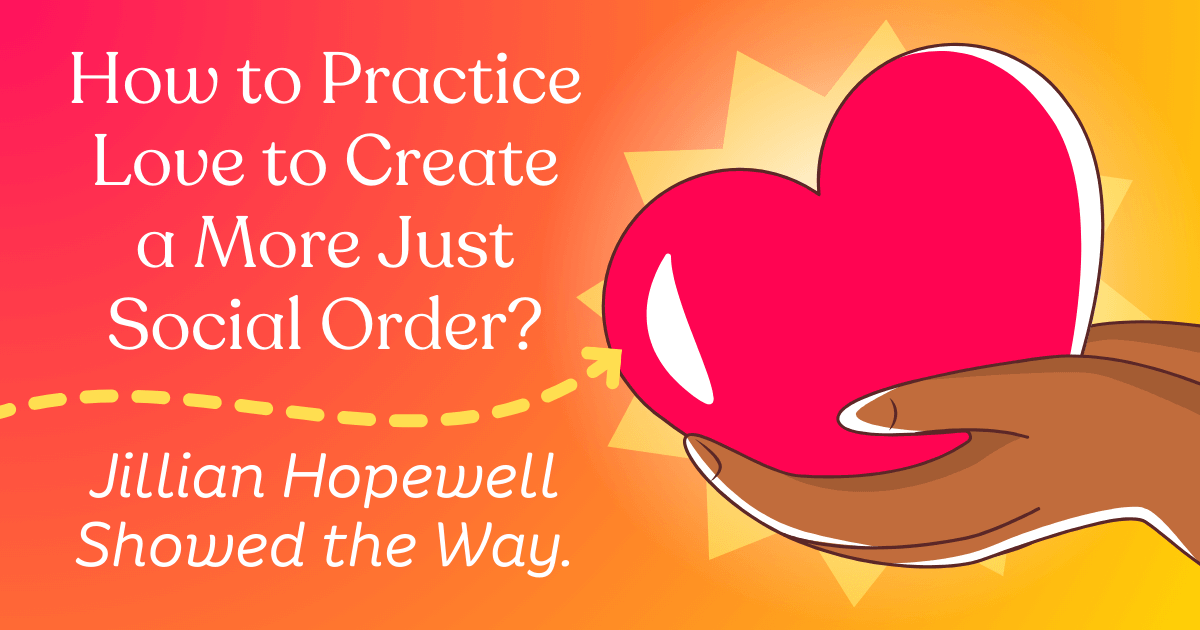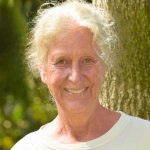How to Practice Love to Create a More Just Social Order? Jillian Hopewell Showed the Way.

[Editor’s Note: Here on our blog, MCN’s Director of Witness to Witness, Kaethe Weingarten, PhD, shares stories, resources, and helpful tips to support health care workers through the many stressors of their daily lives. Many within our clinical network strive toward health justice in our work; in this article, Dr. Weingarten explores love as a practice to achieve social justice. Dr. Weingarten also offers a newsletter (called the W2W Update), filled with resources, recent articles, and her news and views.]
This Valentine’s Day, it occurred to me, as it did to others I read this month, that love isn’t just a feeling. It’s an action, a practice, it’s something we do. It’s odd to me that this has suddenly come to me since I have been writing about hope as a verb, as something we do, preferably with others, for twenty-five years! When we think about hope as something we do, the kinds of questions we ask change. Instead of asking ourselves, “Why do I feel hopeless?” we can ask, “Who will do hope with me?” The same kind of shift happens when we think of love as a practice. Instead of asking, “Do I feel loved?” we can ask, “Am I doing love, for what purpose and with whom?”
And we can apply these kinds of questions about love as a practice to our personal life, with questions like, “Have I tended my relationships so that they flourish?” Or, “Do those I love feel my love in ways that are sustaining to them?” These are all questions worth asking ourselves.
“Love isn't something natural. …It isn't a feeling, it is a practice,” said Erich Fromm (1900-1980) who used social psychology, psychoanalysis, and sociology to understand human existence. I read his work in college and graduate school, over fifty years ago, but I don’t remember this idea. He pivots from thinking of love as a practice that is only relevant for one person to “do” in relation to another person, and conceptualizes love as an absolute necessity to create a just social order. This can only happen, he believes, if we make radical changes in our social structure.
How does love as a practice change our social structure? And what are the ways we can practice love to create a more just social order?
One of the radical changes in our social structure might come from truly believing that we exist interdependently, what the South African concept of ubuntu means. I think it is worth quoting at length from an essay published in 2011 written by Archbishop Desmond Tutu, the Nobel Prize winner, anti-apartheid activist, and proponent and quintessential example of the practice of joy. The essay’s title is: “Ubuntu: On the Nature of Human Community.”
In our African weltanschauung, our worldview, we have something called ubuntu. In Xhosa, we say, “Umntu ngumtu ngabantu.” This expression is very difficult to render in English, but we could translate it by saying, “A person is a person through other persons.” We need other human beings for us to learn how to be human, for none of us comes fully formed into the world. We would not know how to talk, to walk, to think, to eat as human beings unless we learned how to do these things from other human beings. For us, the solitary human being is a contradiction in terms.
Ubuntu is the essence of being human. It speaks of how my humanity is caught up and bound up inextricably with yours. It says, not as Descartes did, “I think, therefore I am” but rather, “I am because I belong.” I need other human beings in order to be human. The completely self-sufficient human being is subhuman. I can be me only if you are fully you. I am because we are, for we are made for togetherness, for family. We are made for complementarity. We are created for a delicate network of relationships, of interdependence with our fellow human beings, with the rest of creation.
The South African concept of Ubuntu has similarities to the engaged Buddhist view of “interbeing,” a word coined by the Vietnamese Zen Buddhist monk, Thich Nhat Hanh, to emphasize the interconnectedness of all beings and things. The concept of interbeing is meant to encourage those who think about it deeply to feel a profound sense of connectedness to all that is and therefore to foster a sense of responsibility towards all of creation.
If we truly believe we do have a responsibility towards all creation, there are so many different ways we can act and so many arenas to act in. At Migrant Clinicians Network, we act primarily in the arena of health justice. Health justice is a broad field that encompasses health law, health policies, and social movements dedicated to building “the power of individuals and communities affected by health inequities to create and sustain conditions that support health and justice,” according to one journal article. The health justice model recognizes the interconnectedness of individuals, that people are interdependent members of communities.
Virtually all of our work at MCN is grounded in the principles of health justice and yet I doubt we think of ourselves as “doing love” when we open our computers and start our day. But what if we did? What if our ideas about health justice were connected to an idea about love as a practice? This month, MCN published a blog about Jillian Hopewell, MCN’s Chief Program Officer for Education and Communications who died December 17, 2023. The title of the blog names her a “health justice warrior.” A warrior is deeply engaged in a struggle for what they care about, and Jillian was passionate about health justice. I think that what comes shining through in the remembrances included in this blog is that Jillian was doing health justice as a practice of love. If we circle back to Erich Fromm, and repeat the question posed by his perspective -- what are the ways we can practice love to create a more just social order? -- I think we can say that Jillian was doing health justice as a practice of love because she, like Fromm, believed that the practice was an absolute necessity to create a just social order. We will miss Jillian for many reasons, and we will continue to be inspired by her. I know I will aspire to be a person who does love as a practice for health justice.
- Log in to post comments
